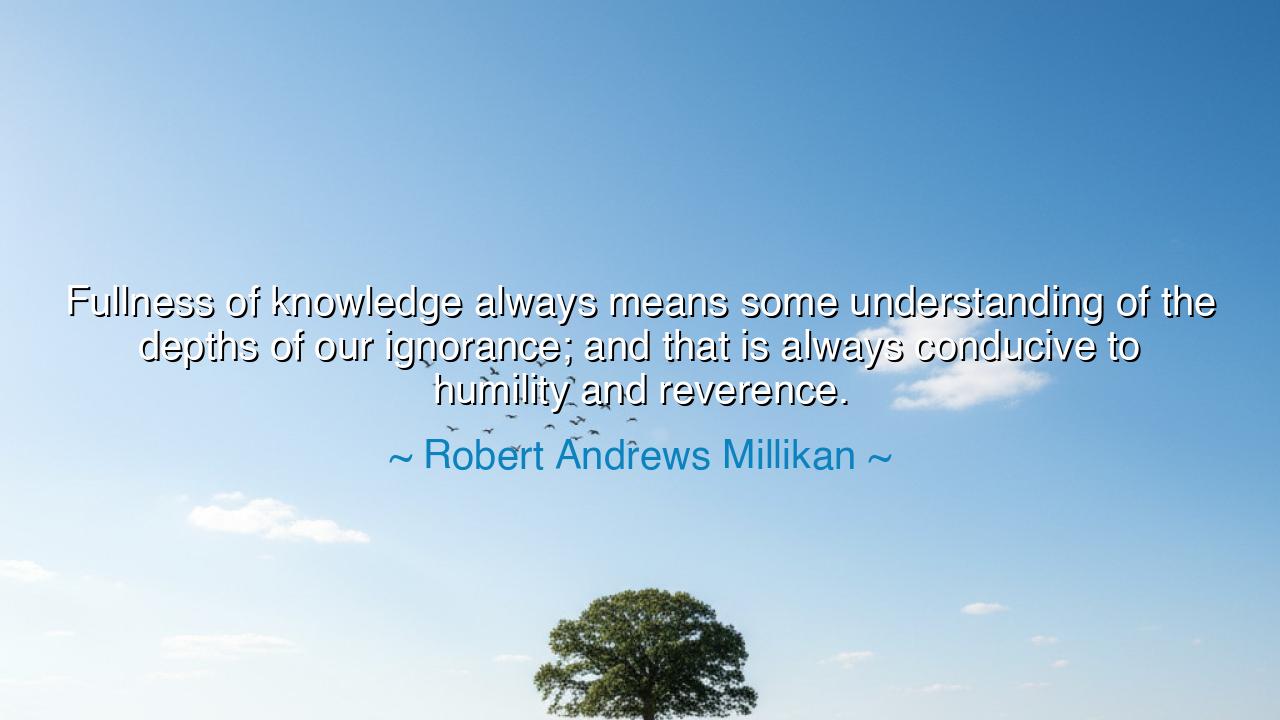
Fullness of knowledge always means some understanding of the
Fullness of knowledge always means some understanding of the depths of our ignorance; and that is always conducive to humility and reverence.






“Fullness of knowledge always means some understanding of the depths of our ignorance; and that is always conducive to humility and reverence.” — Robert Andrews Millikan
In this profound and humbling reflection, Robert Andrews Millikan, one of the great minds of modern physics, speaks the language of both the scientist and the sage. His words remind us that true knowledge is never arrogant, for it carries within itself the awareness of how little we truly know. To possess fullness of knowledge is not to claim mastery over the mysteries of existence, but to stand in awe before them — to look upon the vastness of truth and feel one’s own smallness within it. The deeper we drink from the well of understanding, the more we perceive its infinite depth, and the more our souls are filled with humility and reverence.
The origin of this wisdom lies in Millikan’s own life and work as both a scientist and philosopher. A Nobel Prize–winning physicist, he devoted his life to uncovering the hidden laws of the universe. Through careful experiments — most famously, his measurement of the electron’s charge — he peered into the unseen world of the subatomic and brought light to the darkness of mystery. Yet, rather than pride, his discoveries inspired awe. He came to see that each answer uncovered only greater questions. Each new insight, instead of ending the search, expanded the horizon of the unknown. Thus, through the fullness of his knowledge, he came face to face with the infinite ignorance that surrounds all human understanding — and from this revelation, he drew not vanity, but reverence.
This truth is not new; it echoes through the ages. The ancients knew that wisdom begins not in certainty, but in wonder. Socrates, the philosopher of Athens, once declared that the only thing he truly knew was that he knew nothing. This was not despair, but the beginning of wisdom — the recognition that human understanding, however vast, is but a candle before the endless sky. Millikan’s words are the scientific echo of that same ancient humility. He saw that the modern mind, armed with telescopes and microscopes, was still standing at the threshold of mystery. The more we uncover the laws of the universe, the more we sense the immensity of the unknown. In the face of that immensity, arrogance is folly, but reverence is truth.
Consider the story of Isaac Newton, the titan of science whose discoveries reshaped humanity’s view of the cosmos. Near the end of his life, Newton wrote: “I do not know what I may appear to the world, but to myself I seem to have been only like a boy playing on the seashore, finding a smoother pebble or a prettier shell than ordinary, while the great ocean of truth lay all undiscovered before me.” Even the man who unveiled the laws of gravity and motion — who held the keys to the stars — stood in awe before the ocean of mystery. This is the essence of Millikan’s message: the more knowledge one gathers, the greater the awareness of one’s ignorance becomes. The wise do not boast of knowing; they bow in gratitude for the privilege of glimpsing the divine order.
Such humility does not weaken the mind; it strengthens it. For humility guards against arrogance, the great destroyer of truth. When man believes he knows all, he ceases to question; when he ceases to question, he ceases to learn. Reverence, too, flows from this same recognition. The truly enlightened soul looks upon the universe not as a mechanism to be mastered, but as a sacred mystery to be honored. The rising sun, the beating heart, the patterns of atoms and galaxies — these are not mere data, but living poetry. Knowledge that leads to pride breeds blindness; knowledge that leads to reverence opens the eyes of the soul.
Millikan’s teaching, then, is not a call to ignorance, but to wisdom joined with humility. To seek knowledge is noble; to worship it is foolish. The wise man learns with diligence but never forgets that each answer is a doorway to deeper questions. He does not use knowledge to elevate himself above others, but to serve, to understand, to marvel. And in his reverence, he finds peace — for to stand before mystery with awe is to be in harmony with the universe itself.
Therefore, dear seeker, let this truth dwell in your heart: pursue knowledge, but let humility walk beside you. Learn deeply, but never boast of your learning. Look upon the world with the eyes of both scientist and poet — examining with precision, yet worshiping with wonder. When you discover something new, do not say, “I have conquered truth,” but rather, “I have glimpsed its shadow.” Let reverence be your companion, for the more you understand, the more you will love the mystery that remains.
And so, remember the eternal wisdom of Robert Andrews Millikan: “Fullness of knowledge always means some understanding of the depths of our ignorance; and that is always conducive to humility and reverence.” Knowledge may give power, but only humility gives light. The wise are not those who know everything, but those who, in knowing much, never forget to bow before the infinite — the eternal, unending mystery that is life itself.






AAdministratorAdministrator
Welcome, honored guests. Please leave a comment, we will respond soon